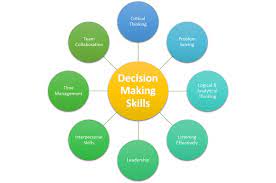Eight Tips for Making Ethical Decisions
- Understand the situation: Take time to understand the facts and implications of the decision you are making.
- Consider all perspectives: Think about how your decision will affect different people and groups, including those who may not have a voice in the process.
- Research: Gather information from reliable sources to ensure that your decision is based on accurate facts and data.
- Analyze alternatives: Consider all possible options, looking at both short-term and long-term consequences for each one before deciding which is most appropriate for the situation.
- Consult experts: Seek advice from people who have knowledge or experience related to the issue at hand, such as legal advisors or ethicists if necessary.
- Think critically: Question assumptions, challenge biases, and evaluate potential outcomes to ensure you are making an informed choice that takes into account all relevant factors.
- Act with integrity: Make sure your decisions reflect your own values and principles by considering their impact on society as a whole rather than just what is best for yourself or a specific group of people in the short term.
Understand the situation: Take time to understand the facts and implications of the decision you are making.
Making ethical decisions can be difficult and often requires careful consideration of the facts and implications of the decision. It is important to take the time to understand the situation before making any decisions. This means gathering all available information, considering all possible outcomes, and understanding any potential consequences.
By taking the time to understand the situation, you can ensure that your decision is based on facts rather than assumptions or biases. You can also weigh the pros and cons of different options and make sure that your decision is in line with your values and goals. Understanding the situation will help you make a more informed decision that is both ethical and beneficial for everyone involved.
Consider all perspectives: Think about how your decision will affect different people and groups, including those who may not have a voice in the process.
When making an ethical decision, it is important to consider all perspectives. Taking the time to think about how your decision will affect different people and groups is essential for making a good decision. This includes considering those who may not have a voice in the process.
For example, when making a decision that involves a large group of people, it is important to consider how the decision will affect those who are not part of the group. It could be that they are excluded from the process altogether or that they may not have access to the same resources as other members of the group. In either case, their perspective should be taken into account and their opinions should be heard before any decisions are made.
It is also important to think about how your decision will affect those who are most vulnerable in society – such as children, elderly people, or people with disabilities – as well as those who are disadvantaged due to their race, gender, or socio-economic status. Ensuring that everyone’s perspective is taken into account can help ensure that no one is left behind and that everyone has a chance to have their voice heard.
By taking the time to consider all perspectives when making an ethical decision, you can ensure that you make an informed and fair choice that takes into account everyone’s needs.
Research: Gather information from reliable sources to ensure that your decision is based on accurate facts and data.
Making ethical decisions can be a difficult task, especially when you don’t have all the facts and data available. To ensure that your decision is based on accurate facts and data, it is important to do research from reliable sources. This means that you should look for sources that are trustworthy, unbiased and up-to-date.
Start by researching the issue at hand. Read articles, watch videos and talk to experts in the field to gain a better understanding of the situation. Once you have a good grasp of the issue, start looking for reliable sources of information. These can include newspapers, magazines, books and online sources such as websites or blogs. Make sure to verify the accuracy of the information before making any decisions.
It also helps to consider different perspectives when making ethical decisions. Talk to people with different views and opinions on the issue so you can get a better understanding of how others view it. This will help you make an informed decision that takes into account all sides of the argument.
By taking the time to do research from reliable sources and considering different perspectives, you will be able to make an ethical decision with confidence knowing that it is based on accurate facts and data.
Analyze alternatives: Consider all possible options, looking at both short-term and long-term consequences for each one before deciding which is most appropriate for the situation.
Making ethical decisions can be a difficult task, especially when the decision has far-reaching implications. One tip to help make the process easier is to analyze all alternatives. This means taking time to consider all possible options, looking at both the short-term and long-term consequences of each one before deciding which is most appropriate for the situation.
Analyzing alternatives requires careful thought and consideration. It should involve discussing the pros and cons of each option with other stakeholders, such as colleagues or supervisors, who may have an interest in the outcome of the decision. This can help to ensure that all perspectives have been taken into account and that any potential risks have been identified.
It is also important to consider how each alternative might affect not only those directly involved but also those indirectly impacted by it. For example, if a decision affects a particular group of people, then it is important to think about how it might affect their families or communities as well.
By taking the time to analyze all alternatives and look at both short-term and long-term consequences, it becomes easier to make an ethical decision that takes into account all relevant factors. Doing this will help ensure that any decision made is in line with an organization’s values and objectives, as well as being in the best interests of all those affected by it.
Consult experts: Seek advice from people who have knowledge or experience related to the issue at hand, such as legal advisors or ethicists if necessary.
When it comes to making ethical decisions, it is important to consult experts who have knowledge or experience related to the issue. This could include legal advisors or ethicists, depending on the situation. Consulting experts can help in understanding the complexities of the issue at hand and provide insight into potential solutions. It can also help ensure that any decisions made are in line with applicable laws and regulations.
Experts can provide valuable input into ethical decision making. They can offer guidance on how to weigh different considerations when making a decision and help identify potential risks associated with certain actions. In addition, they can provide advice on how to communicate decisions effectively and ensure that any potential conflicts of interest are addressed.
By consulting experts when making ethical decisions, organizations can be better equipped to make sound decisions that are both ethical and legally compliant. This helps to protect the organization’s reputation and ensure its long-term success.
Think critically: Question assumptions, challenge biases, and evaluate potential outcomes to ensure you are making an informed choice that takes into account all relevant factors.
Making ethical decisions can be challenging, especially in a complex and ever-changing world. It is important to take the time to think critically when making ethical decisions to ensure that the best possible outcome is achieved.
When thinking critically, it is important to question assumptions, challenge biases, and evaluate potential outcomes. By questioning assumptions, we can ensure that our decision making is based on facts and not on preconceived notions. Challenging biases helps us to make decisions based on logic rather than on personal feelings or preferences. Lastly, by evaluating potential outcomes, we can make sure that all relevant factors are taken into account when making an informed choice.
By taking the time to think critically before making ethical decisions, we can ensure that our choices are based on facts and logic rather than on assumptions or biases which could lead to an undesirable outcome. Doing so will help us make the best possible choice and contribute positively to our society.
Act with integrity: Make sure your decisions reflect your own values and principles by considering their impact on society as a whole rather than just what is best for yourself or a specific group of people in the short term.
Making ethical decisions is an important part of being a responsible and conscientious individual. Acting with integrity is a key factor in this process, as it ensures that our decisions are based on our own values and principles, rather than just what is best for ourselves or a particular group of people in the short term.
It is important to consider the impact of our decisions on society as a whole. We should think about how our decisions will affect not only ourselves but also those around us, both now and in the future. Taking into account the potential long-term consequences of our actions can help us make more informed and ethical choices.
In addition, we should strive to be honest and consistent with our actions. Our behavior should reflect our values and principles at all times, even when it may be difficult or unpopular to do so. This means that we must be willing to accept responsibility for the consequences of our decisions and take ownership of their outcomes.
Ultimately, acting with integrity when making ethical decisions can help us make choices that are both beneficial to ourselves and beneficial to society as a whole. By considering their long-term impacts on everyone involved, we can ensure that our decisions are not only ethical but also responsible and conscientious.




